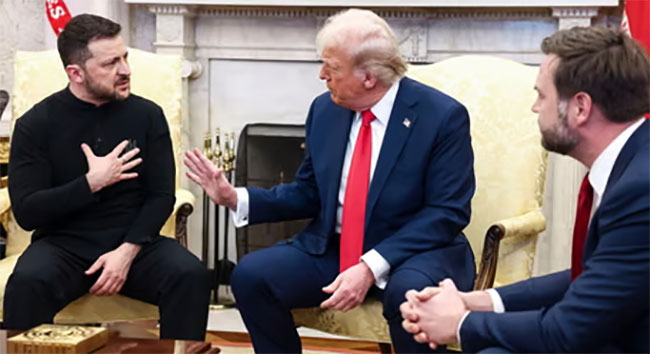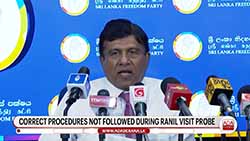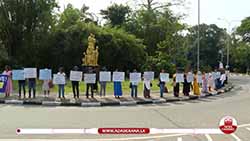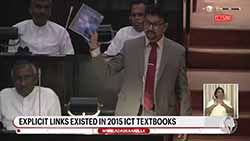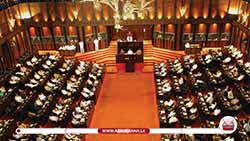Ukraine ‘agrees to Donald Trump-brokered peace plan’, US media reports
November 25, 2025 06:31 pm
Ukraine has agreed to a peace deal in hopes of ending the over three-year war with Russia, according to the White House.
Following talks in Switzerland between the U.S. and European officials, White House Press Secretary Karoline Leavitt said progress has been made in bringing the two Eastern European countries to the negotiating table.
“There are a few delicate, but not insurmountable, details that must be sorted out and will require further talks between Ukraine, Russia, and the United States,” Leavitt posted to social media Tuesday morning.
Similar to the U.S.-proposed peace plan between Israel and Hamas, the U.S. laid out a 28-point peace plan, but it has been reduced to 19 points, according to multiple reports. It is unclear what points are listed.
The announcement of the proposed peace plan comes on the heels of Russian strikes targeting the Ukrainian capital of Kyiv. Ukrainian President Volodymyr Zelenskyy says six people were killed, with at least 13 wounded during the attacks.
In addition to confirming the strikes, Zelenskyy said via social media that he has been on calls with various European leaders, working closely with them to develop a peace plan.
Zelenskyy underscored that only Ukraine can decide what is best for Ukraine, while expressing gratitude to the U.S. for working to broker an end to the bloodshed, which has resulted in the deaths of tens of thousands of Ukrainian and Russian soldiers, as well as Ukrainian civilians.
“We can share the same approach: Ukraine’s security can only be decided with Ukraine, just as Europe’s security can only be decided with Europe,” Zelenskyy wrote on social media. “This is exactly what we are doing right now through our shared efforts. We value the United States’ constructive approach in this joint work to put an end to the bloodshed and war.”
There had been multiple reports that Zelenskyy was poised to return to Washington, but Leavitt on Monday afternoon said there were no plans yet.
The clock is ticking on Donald Trump’s so-called peace deal to end the Ukraine war. The US president says Kyiv has until Thursday to agree or face being cut off from American weapons, intelligence sharing and financial aid. But how can they agree to a package of measures that effectively gives Russia the spoils of its illegal invasion with little in return beyond agreeing not to bomb and kill?
Of course a ceasefire would be a blessed relief for the beleaguered and exhausted Ukrainians who have endured more than three years of misery. The temptation to end the conflict is powerful but the terms are unacceptable.
European leaders spent the weekend discussing the proposed deal and found it wanting, not least since they were not involved in drafting it. They have come up with a rival plan that involves stationing Nato troops in Ukraine, something Russia opposes, and holds out the prospect of future membership of the bloc.
But for Ukraine to carry on it needs to be able to harm Russia’s economy, especially its energy infrastructure, for which it needs more long-range missiles and other weaponry. If Mr Trump is serious about withdrawing US help then Europe has to step into the breach.
Yet there is still no agreement about what to do with the billions of frozen Russian assets (though some will be used to rebuild Ukraine under the Washington/Moscow deal) nor any real sense of how far European countries, including the UK, will go to face down President Trump.
A statement issued by the G20 countries minus America said the deal contained elements for a “just and lasting peace”, while Sunday’s behind-closed-doors talks in Geneva were described as “constructive” but did not include Russia. It is unconscionable to continue encouraging Ukraine to fight without the wherewithal to secure a ceasefire on its own terms, not Moscow’s.
America’s top diplomat struck a relentlessly upbeat tone in Geneva, after a rollercoaster day of intensive negotiations aimed at convincing a skeptical Ukraine to accept the latest US proposals to end Russia’s brutal war.
“I feel very optimistic that we can get something done here, because we made a tremendous amount of progress,” the US Secretary of State, Marco Rubio, told me at a late-night news conference at the US Mission in the Swiss city.
Even President Donald Trump, who just hours earlier had again publicly scolded the Ukrainian leadership for expressing what he regarded as insufficient gratitude, was now “quite pleased at the reports we’ve given him about the amount of progress that’s been made,” Rubio added.
But the Secretary of State, who unexpectedly appeared in the briefing room alone, instead of being accompanied, as he had been earlier that day, by the powerful head of the Ukrainian delegation, Andriy Yermak, repeatedly refused to be drawn on the specifics of what had been achieved.
“I’m not going to get into the details of the topics we discussed, because this is an ongoing process,” Rubio told me, while suggesting in other comments that “the items that remain are not insurmountable.”
But given the extent of the deep compromises Ukraine is being called on to make in the publicly available version of the US peace proposals – which are seen as heavily favoring Russia – the suggestion that they can be easily overcome rings hollow.
The proposal for Ukraine to surrender key territories in the Donbas region of Eastern Ukraine, for example, that Russia has annexed but not captured, has been a longstanding red line for Kyiv, not least because the area includes the “fortress belt” of heavily defended towns and cities seen as essential to Ukrainian security.
The US proposals seen by CNN suggest the area becomes a Russian demilitarized zone, which the Kremlin’s military forces would agree not to enter. But ordering the Ukrainian military to hand over land that its troops have fought and died to keep would be a hard sell.
Same too, the proposed limitation on Ukraine’s armed forces. Although set at a maximum of 600,000-strong in the US plan, European officials say they fear it would leave the country vulnerable to future attack.
But Washington, seemingly even more determined to force through a peace deal, has made it clear it expects Ukraine to comply, threatening to withdraw US military support for Kyiv and to essentially abandon the Ukrainian President Volodymyr Zelensky – in the words of President Trump – “to fight his little heart out.”
In a statement on Sunday night from Washington, the White House said that the Ukrainians believe the latest draft of the peace proposals “reflects their national security interests,” after various revisions and clarifications made with input from top US, Ukrainian and European officials in Geneva.
“The Ukrainian delegation affirmed that all of their principal concerns – security guarantees, long-term economic development, infrastructure protection, freedom of navigation, and political sovereignty – were thoroughly addressed during the meeting,” the statement said.
And it’s not just the White House that appears to be talking up the Geneva negotiations. Earlier, the Ukrainian delegation head Yermak, heaped praise on the talks, calling them “very productive.”
“We have had very good progress and we are moving forward to a just and lasting peace,” Yermak added, standing alongside Rubio in an earlier press briefing.
Even some Europeans – who had previously expressed concern at being sidelined at the talks in Geneva – seemed to praise their outcome. The German foreign minister, Johann Wadephul, said the talks produced a “decisive success” for Europe.
“All issues concerning Europe, including those concerning NATO, have been removed from this plan,” Wadephul told the German Deutschlandfunk radio station.
There have been some words of caution, such as from the Finnish president, Alexander Stubb, who spoke with his Ukrainian counterpart before commenting on X that “negotiations were a step forward but there are still major issues to be resolved.”
But even if the current draft US peace proposal, which Rubio called a changeable “living, breathing document” does indeed now work for the US, Ukraine and it’s European backers, it is very possible that it would no longer work for the Kremlin, which has consistently refused to back down from its maximalist demands.
And Moscow has so far faced limited US pressure to do so.
In Geneva, Rubio repeatedly side-stepped my attempts to ask him whether the US would also expect Russia, not just Ukraine, to make any significant concessions.
But if the White House is actually serious about achieving what it now calls “a durable, comprehensive peace” in Ukraine, somehow convincing the Kremlin to compromise may be its best bet.
- Agencies



